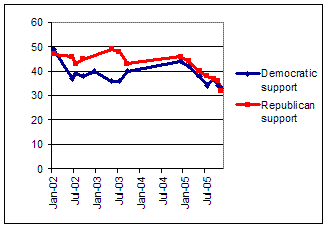« options for Iraq | Main | Happy Thanksgiving »
November 23, 2005
Galston on the Democrats

My boss, Bill Galston, is leaving us in January to go to the Brookings Institution. I don't think any other academic in America has as much political influence on the Democratic Party. When he and Elaine Kamarck released their latest strategy paper recently ("The Politics of Polarization"), both The New York Times and The Washington Post ran news stories describing it. Bill and I very rarely talk about partisan or ideological politics, because our shared professional work is strictly non-partisan. However, he gave a public talk yesterday on his new paper, and I attended it.
We have intellectual freedom at the University of Maryland, so I reserve the right to disagree with my boss. Nevertheless, I'd like to emphasize part of the Kamarck-and-Galston argument that I particularly strongly endorse. This argument says that you can't get people to vote for you unless you have a plausible and coherent answer to national problems. No amount of skillful leadership and rhetoric and "framing" can paper over incoherence. Between 1988 and 1992, the Democrats had big internal fights over welfare and macroeconomics. I'm not certain that the best side won, but there was a decisive conclusion. Bill Clinton took control of the national party and balanced budgets and reformed welfare. As a result, the public's opinion of the Democrats on economic and social issues changed fundamentally and for the better.
However, the Democrats never resolved their profound disagreements over foreign policy. They won pluralities of the national vote in 1992, 1996, and 2000 without taking clear positions on difficult international and defense issues. They got away with that because foreign policy was less important between the end of the Cold War and 9/11/01 than at any time since Pearl Harbor. They cannot get away with it now. The Democratic Party includes genuine Peaceniks, John Murtha-style tough guys, Madeleine Albright internationalists who say "use it or lose it" about the US military, "bring America home" types, and everything in between. They will have to fight it out until one faction wins. They will then be able to present the public with a clear alternative to the Bush position.
Yesterday, Bill described John Kerry as the perfect representative of his party in 2004. Voting for the war and then against the bill to fund it put Kerry precisely at the median of the Democratic coalition. That is why he defeated primary opponents whose positions were more consistently pro- and anti-war. It is also a big reason why he lost in November.
The current unpopularity of the GOP means little. In 2006, they will be protected by the safety of congressional districts. In 2008, they will put up an entirely new face as their presidential candidate; he will probably criticize the Bush administration. The only thing that matters for the future of partisan politics is whether the Democrats can increase their support. Since the public is seriously concerned about foreign policy, the Democrats need a positive international vision with some detail and some bite.
Two competing visions might be considered:
1. Lower our international profile. Make concerted efforts to reduce dependence on mideast oil. Reduce defense spending over time and use the savings on domestic investments. Deal with issues like Israel-Palestine and the Korean peninsula only as part of coalitions. Disentangle from Iraq. Concentrate on remaining a major economic power that can afford a dominant but defensive military.
2. Aggressively pursue terrorists and rogue states. However, disentangle from Iraq, where too many of our troops are pinned down in unfavorable circumstances. Pursue Rumsfeld's pre-9/11 military reforms and use a lighter, quicker, more flexible military in North Africa, Central Asia, Southeast Asia, and wherever the situation favors us.
Posted by peterlevine at November 23, 2005 08:29 AM
Comments
I have some comments on "The Politics of Polarization" that I wrote for Ezra Klein's blog. I think it's very good work, for the most part, though perhaps a bit to pessimistic. Of course, pessimism is a healthy characteristic in a political operative.
Galston is undoubtedly correct that on foreign policy, part of the problem is that the public doesn't "know where they stand". As I emphasize, voters often use "knowing where they stand" as a proxy for a President's decision making process.
One solution is to refocus Democratic foreign policy priorities on areas of agreement. At this point, there is broad agreement within the party that America does more good than harm. There are disagreements over how to get out of Iraq, but provided Chuck Hagel does not win the nomination in some freak occurrence, it will be very difficult for a Republican to win the nomination without supporting the Iraq war in some fashion. Then it will become possible for the Democratic nominee to seize the "peace with honor/modest withdrawl" ground and present him or herself as an acceptable alternative to the Republican nominee, and focus on other priorities where there is more Democratic agreement, such as the Sudan.
I would caution that at this point in the election cycle in 1993, Clinton's gays-in-the-military, tax-raising, socialized-medicine agenda had driven down Democratic support but had not driven up Republican support. There is no reason to fret about current poll numbers. Frustration with government is always taken out on the party of the President, and the Democratic message machine has not yet ramped up.
Posted by: Nick Beaudrot ![[TypeKey Profile Page]](http://www.peterlevine.ws/mt/nav-commenters.gif) at November 23, 2005 12:35 PM
at November 23, 2005 12:35 PM
Post a comment
This blog is under attack from comment spammers, who are causing a problem for the server. I believe I can block them by upgrading to a recent version of MoveableType. However, I do not have time to do that until late December. Therefore, I have temporarily disabled comments. Please feel free to email me feedback at plevine@umd.edu.